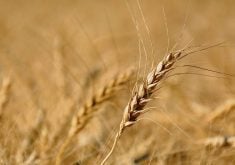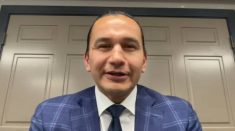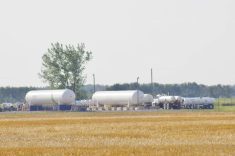“I think what a lot of people have come to understand is that they can count on the NFU to watch farmers’ bottom lines.”
– STEWART WELLS
The National Farmers Union (NFU) is like Cassandra of Greek mythology – it predicts the future, but nobody believes it, according to Stewart Wells, who after eight years as union president, isn’t running again.
Wells, a 3,600-acre Swift Currentarea farmer who has served on the NFU’s board of directors for 12 years, says it’s time to make room for new blood. (The NFU’s constitution restricts office holders to a maximum term of 10 years.)
Read Also

Mazergroup’s Bob Mazer dies
Mazergroup’s Bob Mazer, who helped grow his family’s company into a string of farm equipment dealerships and the main dealer for New Holland machinery in Saskatchewan and Manitoba, died July 6 from cancer.
After being acclaimed as president in November 2001, Wells said in an interview with the Manitoba Co-operator one of his priorities would be forging alliances – both urban and rural.
Looking back, Wells said he did just that during the battle to block the introduction of genetically modified (GM) wheat, the fight to preserve the right of farmers to save and plant their own seed, the struggle to retain the Canadian Wheat Board’s single-desk marketing powers and efforts to block Bill C-13 and changes to the Canadian Grain Commission.
“In all of these cases it was the farmers’ union working with allies and working through coalitions and alliances to make positive changes, always keeping the eye on farmers’ bottom lines,” Wells said.
Wells said a biggest disappointment has been general farm organizations and commodity groups kowtowing to the federal government.
“I’m even more astounded now than I was 12 years ago that even when some of these organizations know, and will tell you privately that they know, something is wrong they refuse to stand up to government because they’re afraid of the government,” Wells said. “Farmers have been let down in those circumstances.”
A “key” disappointment Wells said is that he knows thousands of Canadian farmers agree with NFU policies, yet don’t take out a $150 annual membership.
Still, Wells takes comfort in that the NFU’s membership has grown seven years in a row, even though the total number of farmers declined.
Currently the NFU has 6,674 members, making it the largest voluntary, direct-membership general farm organization in Canada. (The Canadian Federation of Agriculture and
Grain Growers of Canada have more, but are umbrella organizations.)
Many of the NFU’s new members come as a result of stable funding regulations for general farm organizations in Ontario, Prince Edward Island and New Brunswick.
But the NFU’s policies also account for the increase in members, Wells said.
“I think what a lot of people have come to understand is that they can count on the NFU to watch farmers’ bottom lines,” he said.
Corporations that sell to and buy from farmers have consolidated and have the market power to extract commodity price increases from farmers, he said. According to Wells, Canadian farmers have $60 billion in debt, but only gross
$125 million a year from the marketplace to pay that debt.
“Farmers should be paid for what they do; they shouldn’t have to rely on government transfers, they shouldn’t have to rely on selling their assets, they shouldn’t have to rely on off-farm jobs,” Wells said.
Some argue farming is just like any other business and should be treated accordingly.
“That is fundamentally untrue and it’s because of our total and complete reliance on the weather…,” Wells said.
Wells agrees that NFU also struggles partly because it’s perceived by some as radical or on the fringe. There’s a “whisper campaign” against the NFU, he said.
It doesn’t help that the NFU often tells farmers what they don’t want to hear about the food supply, the direction of government policies, world trade, farm incomes and corporate power.
“But in all of these cases we have been right,” Wells said. “We’ve been these unwilling Cassandras that are flagging these problems at the beginning when they first surface – five, 10, 15 years ago. And people say, ‘well that’s just the NFU being controversial, or the NFU being negative.’ Then the thing comes to pass and really bad things happen to farmers… and they say, ‘gee, I guess the farmers’ union was right.’ But there is no joy in it.” [email protected]



















